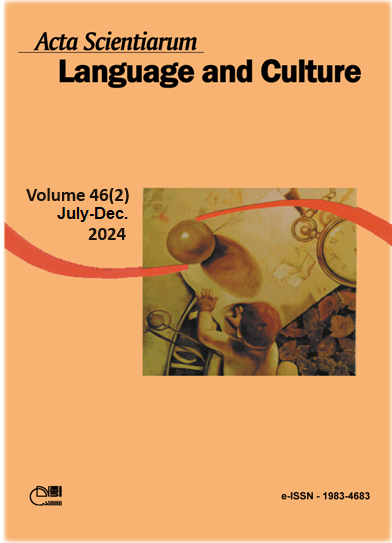Writing voices: Conceição Evaristo and Roberta Tavares
Abstract
Brazilian black female poetry instigates reflections on the review of domination practices supported by coloniality, through the reconfiguration of imaginaries and identities. Thus, this article analyzes how Conceição Evaristo (Southeast region), Roberta Tavares (North region), from their voices, space, memory and black body, manage, in a poetic way, to create paths of insurgency that re-signify racial identity and promote a decolonial turn in the face of hegemonic discourses, in the works Poemas da remembrance and other movements, from 2008, and Mulheres de Fogo, from 2023. The importance of discussing black Brazilian poetry as an epistemic response to the Eurocentric project is highlighted. The voices of these black authors rise up against racism, patriarchy and the erasure of their ethnic-racial origins. The texts mark poetic voices that reveal how literary writing represents another poetics, which does not submit to that of a literature considered canonical, because it has its own canon and its own rules. In general, this literature implies another way of writing. In this sense, it is important to investigate what poetics this is, as well as the texts of these writers, who are a voice in Brazilian literature that forces other Brazilian authors to rethink their productions. Significant theoretical discussions for the analysis and understanding of the corpus come from Duarte (2011), Said, (2011) and Ricouer (2007), among others. This reflection proposes to think about erasures as forming an aesthetic-political discourse, marked by ethnic-racial issues that reveal the place where these writers belong. The poetic production of the aforementioned writers offers us the opportunity to consider decolonial thinking as a confrontation, calling for a political and social transformation.
Downloads
References
Referências
Bandeira, M. (1946). Antologia dos poetas brasileiros bissextos contemporâneos. Rio de Janeiro, RJ: Liv. Ed. Zelio Valverde.
Clube de Escritores Paraenses. (2021, Maio 7). Revoada: voos do processo literário com Roberta Tavares. [Arquivo de vídeo]. Recuperado de https://www.youtube.com/watch?v=pQd9tQ843FY&t=2190s
Duarte, E. A. (2006). O Bildungsroman afro-brasileiro de Conceição Evaristo. Revista Estudos Feministas, 14(1), 305-308. DOI: https://doi.org/10.1590/S0104-026X2006000100017.
Duarte, E. A. (2011). Mulheres marcadas: literatura, gênero e etnicidade. In A.G. Bolaños, & L. R. Benavente (Orgs.), Vocês negras de las Américas: diálogos contemporâneos (p. 163-175). Rio Grande, RS: Editora da FURG.
Duarte, M. (2019). Querem nos calar: poemas para serem lidos em voz alta. São Paulo, SP: Planeta do Brasil.
Evaristo, C. (2015). Olhos d’água. Rio de Janeiro, RJ: Pallas; Fundação Biblioteca Nacional.
Evaristo, C. (2017). Poemas da recordação e outros movimentos. Rio de Janeiro, RJ: Malê.
Quilombola Roberta Tavares lança livro de poemas nesta segunda-feira (30). (2021, 30 de agosto). Jornal O Liberal. Recuperado de https://www.oliberal.com/cultura/quilombola-roberta-tavares-lanca-livro-de-poemas-1.428172
Ricouer, P. (2007). A memória, a história, o esquecimento. Campinas, SP: Editora da Unicamp.
Said, E. (2011). Cultura e imperialismo (D. Bottmann., Trad.). São Paulo, SP: Companhia das Letras.
Tavares, R. (2021). Lugar de se morrer é também o poema. Belém, PA: Thiago Kazu.
Tavares, R. (2023a). Mulheres de fogo. Belém, PA: Editora da Autora.
Tavares, R. (2023b). Poeta e historiadora Roberta Tavares lança ‘Mulheres de fogo’, seu segundo livro. [Entrevista concedida a] Thainá Dias. O Liberal.com, [S.l.], 29 mar. 2023. Recuperado de https://www.oliberal.com/cultura/poeta-e-historiadora-roberta-tavares-paraense-lanca-mulheres-de-fogo-seu-segundo-livro-1.663010
Valle, L. D., & Moreira Junior, J. L. M. (2017). O fanzine e a potência educativa no ensino das artes visuais. In Anais do 1º Seminario Internacional de Investigación en Arte y Cultura Visual (p. 234-240). Montevideo: Universidad de la República, Montevideo. Recuperado de https://files.cercomp.ufg.br/weby/up/778/o/CulturaVisual_L1_030.pdf
DECLARATION OF ORIGINALITY AND COPYRIGHTS
I Declare that current article is original and has not been submitted for publication, in part or in whole, to any other national or international journal.
The copyrights belong exclusively to the authors. Published content is licensed under Creative Commons Attribution 4.0 (CC BY 4.0) guidelines, which allows sharing (copy and distribution of the material in any medium or format) and adaptation (remix, transform, and build upon the material) for any purpose, even commercially, under the terms of attribution.
Read this link for further information on how to use CC BY 4.0 properly.




















6.png)









